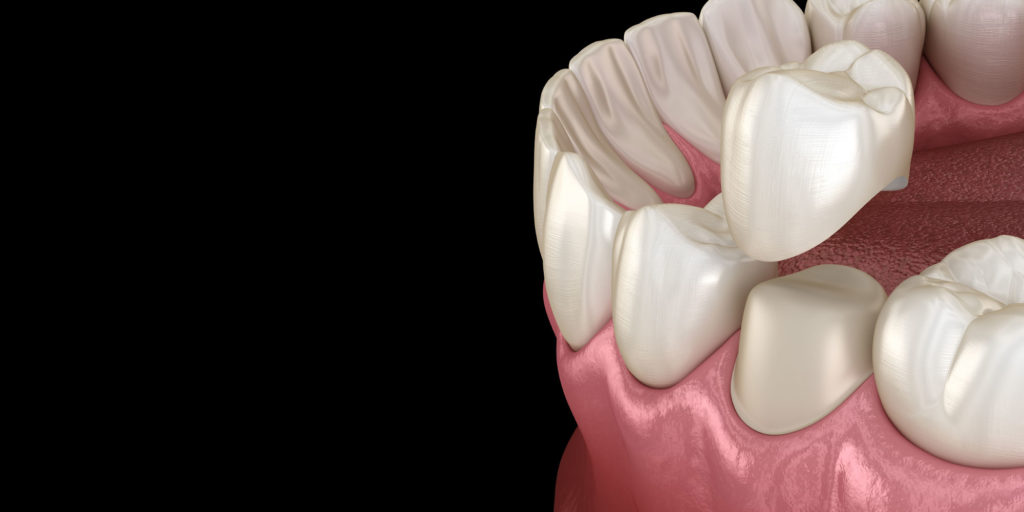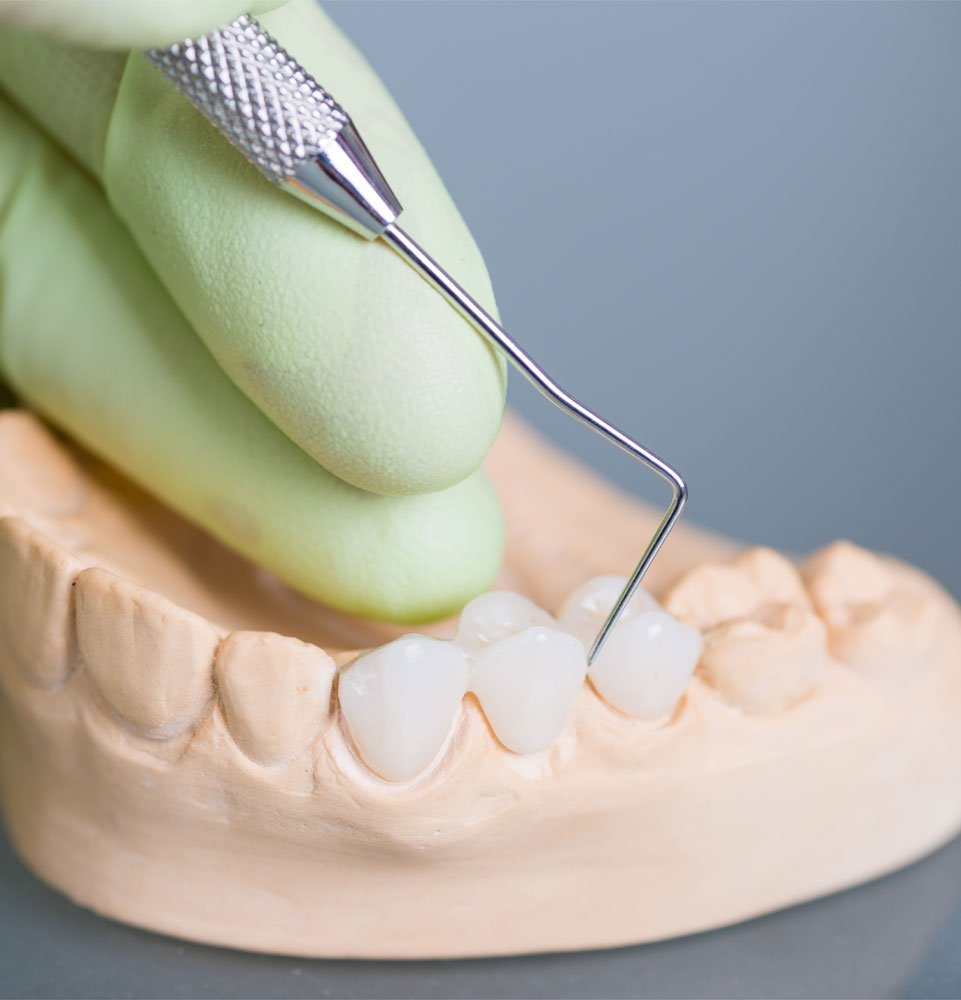



Crowns are most often made of strong, tooth-colored porcelain materials. Gold may be used if exceptional toughness is needed. A dental crown may dramatically improve a tooth’s appearance, shape and alignment. Crowns may be used to:

Crowns can be used for a number of restorative and cosmetic purposes, and our dentists will help you determine whether a dental crown in Waco, TX is a good option for your smile. Each crown is custom made to precisely fit your tooth, so you can feel confident that your restoration will be comfortable, effective and aesthetic.

One or two replacement teeth (dental crowns) are attached to the adjacent teeth or dental implant on either side for support, creating a bridge. These crowns stabilize the artificial tooth that fills the gap left by the missing tooth. The bridge replaces missing teeth, both functionally and cosmetically. Dental bridges are custom made from molds and impressions of your teeth, so your restoration will look like your natural teeth and will aesthetically match and fit your smile. When in place, a bridge can improve your smile by:
“I have been a patient of Creekwood Dental Arts for three years now. It’s the most amazing dental experience I’ve ever had in my life. From the great treatment Dr. Miller has given my teeth and my mouth – believe me I have had really bad teeth. She works until she gets it perfect.”


Dental Crown Patients
We want to make certain that you feel comfortable and confident in the care you receive at our office, and we also work hard to ensure that each visit to our office is pleasant and positive. Our team works hard to ensure your dental experience is comfortable and personalized to your needs. Dr. Miller, Dr. Green, Dr. Sweeney, and Dr. Hinds, along with our team, focus on building long lasting, trusting relationships with our patients.
Our dentists and team enjoy caring for patients of all ages, from children to seniors, and we invite you to bring your entire family to Creekwood Dental Arts.
Dr. Donna G. Miller at Creekwood Dental Arts in Waco, TX, is a highly accomplished general and cosmetic dentist who focuses on providing comprehensive dental care to patients of all ages. Her expertise includes general dentistry, dental implants, cosmetic procedures, and advanced restorative treatments like full mouth reconstruction.
Dr. Miller uses the latest technology, including 3-D imaging and laser dentistry, to ensure precise and minimally invasive care. She has earned prestigious awards, such as the Mastership Award from the Academy of General Dentistry, and actively participates in numerous dental organizations.
Dental crowns and bridges are restorative treatments to repair damaged or missing teeth and restore their function and appearance. A crown is a tooth-shaped cap placed over a damaged or decayed tooth to restore its strength, shape, and appearance. Crowns are commonly made from porcelain, ceramic, metal, or a combination of materials and are used when a tooth is too weak for a regular filling. They protect the tooth from further damage and can be used after root canal treatment or to support dental implants.
A bridge is used to replace one or more missing teeth by anchoring artificial teeth to the adjacent natural teeth or implants. It “bridges” the gap where teeth are missing, helping restore the ability to chew and speak correctly, maintain facial structure, and prevent remaining teeth from shifting out of position.
Both procedures preserve oral health, enhance aesthetics, and maintain overall dental function.
You may need a dental crown if a tooth is severely decayed, damaged, or weakened due to a large filling. Crowns are also essential after root canal treatment, protecting the tooth from breaking. Teeth cracked, broken, or worn down from grinding or acid erosion may also benefit from a crown to restore shape and function.
Additionally, crowns can improve the appearance of discolored or misshapen teeth and are sometimes used to support dental bridges when replacing missing teeth.
At Creekwood Dental Arts, dental crowns are most commonly made from tooth-colored porcelain materials, providing both strength and a natural look. Dental crowns are very strong and durable, offering more structural reinforcement than veneers since they cover the entire tooth. The strength of a crown depends on the material used.
Porcelain is often preferred for its aesthetic qualities, especially for front teeth. In cases where additional durability is required, such as for molars that endure heavy chewing forces, they may also use gold or metal alloys.
To care for your dental crowns, maintain good oral hygiene by brushing twice daily and flossing regularly to prevent plaque buildup around the crown.
Avoid hard or sticky foods that can damage or loosen the crown, and protect your teeth from grinding by using a night-guard if necessary. Additionally, regular dental checkups should be attended to ensure the crown remains in good condition and to monitor the health of the underlying tooth and gums.
The lifespan of dental crowns and bridges typically ranges from 10 to 15 years, but with proper care, they can last even longer—sometimes up to 20 years or more.
The durability depends on several factors, including the material used (porcelain, ceramic, or metal), oral hygiene habits, and lifestyle choices such as avoiding hard foods or teeth grinding. Regular dental checkups are crucial to ensuring crowns and bridges remain in good condition and addressing any potential issues early on.
At Creekwood Dental Arts, dental insurance can help with the affordability of services. Many dental insurance plans provide coverage for crowns and bridges, especially when they are necessary for restoring damaged or missing teeth.
While the extent of coverage varies, insurance typically covers a percentage of the cost. It’s important to check with both your insurance provider and Creekwood Dental Arts to verify what is covered under your plan, including whether your plan covers specific treatments and any out-of-pocket costs.
I understand the information disclosed in this form may be subject to re-disclosure and may no longer be protected by HIPAA privacy regulations and the HITECH Act.
